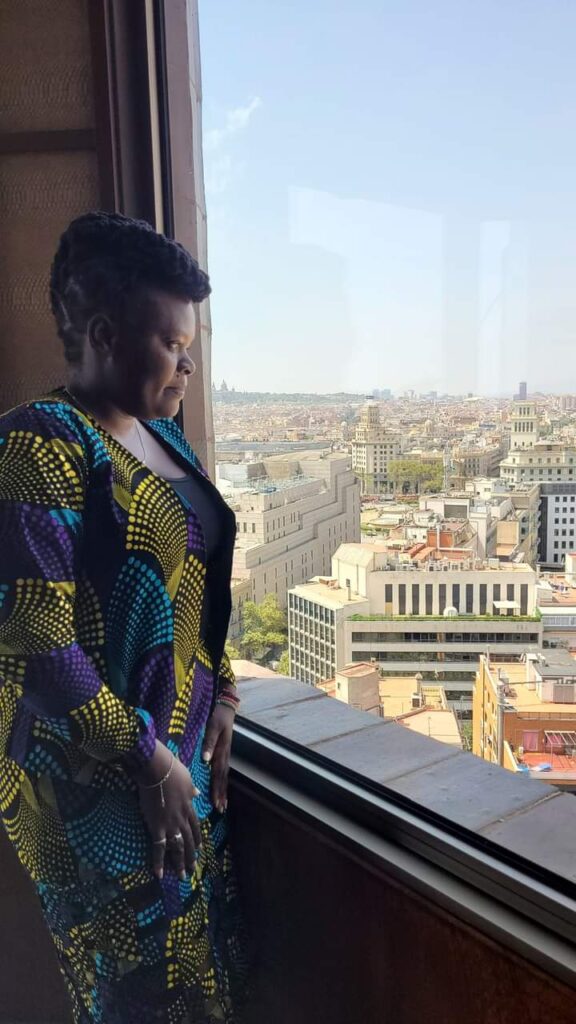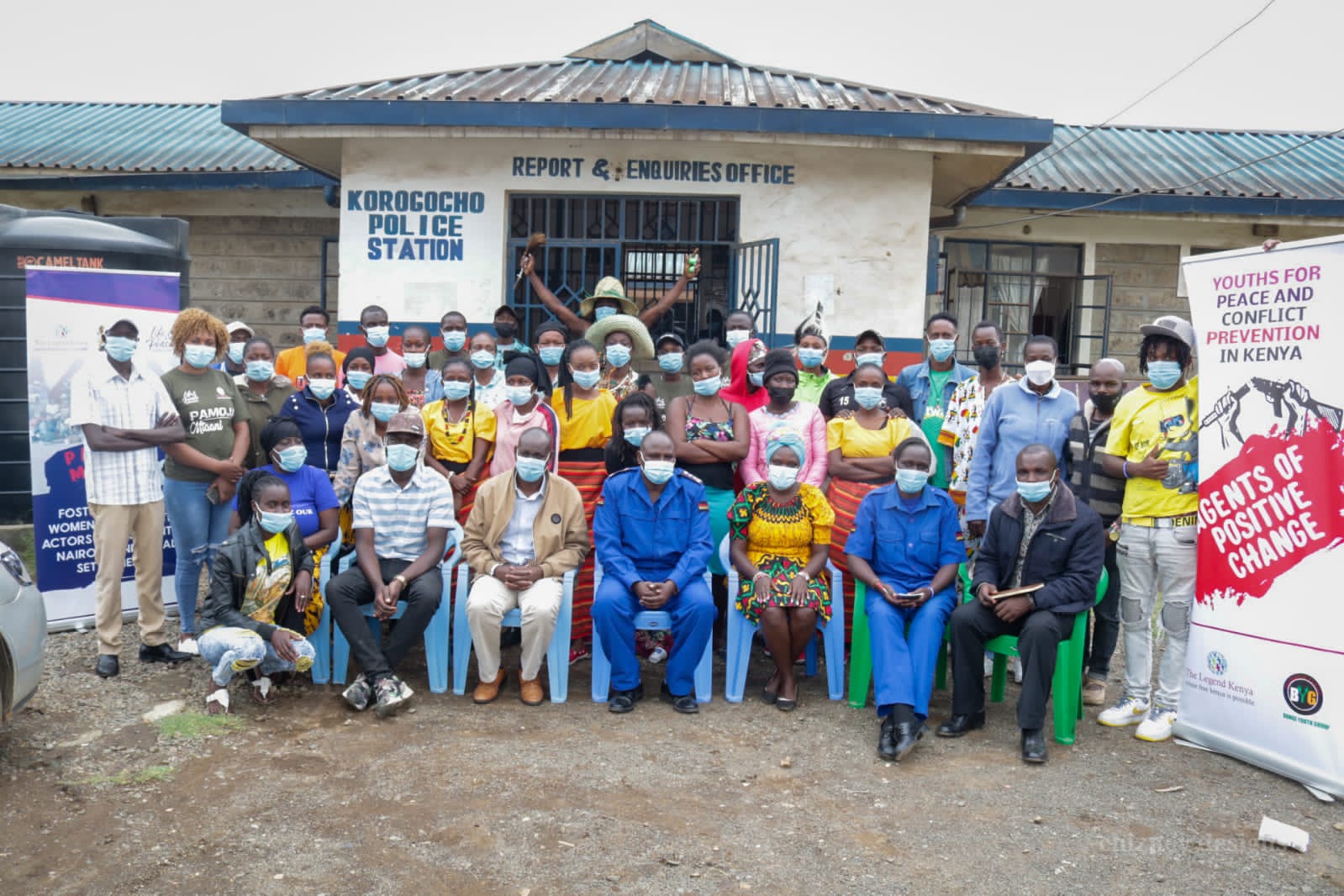Movement Matters #13 – Rose Mbone, The Legend Kenya
Meet Rose Mbone, a visionary peacebuilder from Nairobi. Rose founded The Legend Kenya, fostering nonviolent conflict resolution and amplifying the voices of youth and women in peace efforts. Rose is dedicated to holistic change. For those newer to MCLD, Rose offers advice to embrace the space for learning, creativity, and sustainability in their leadership journey.
Sera Bulbul: Can you give us some information about your background, how you got to where you are?
I am a woman peacebuilder, born and raised in the informal settlement of Korogocho in Nairobi, Kenya. Growing up, I experienced violence and conflict firsthand which led me to do what I do in the community and beyond today. I really am just a young woman peacebuilder from Kenya.
Sera Bulbul: You founded The Legend Kenya. What gave you the idea and what is its mission?
The Legend Kenya is a community-based organization with the following key thematic areas: conflict mitigation, trauma, healing, awareness, and forgiveness. Trying to find a way to deal with violence in a nonviolent approach gave birth to this organization.
In the community, we grew up with violence as the first answer. People want revenge or to cause damage or harm to each other, attacking when something happens. With The Legend Kenya, we felt it was important to get something that would spread a different narrative, to try to address issues in a different way. In a sober and clear way.
We realized there were activities happening in our community but we needed to be organized to participate in them. We also need roots. People need to know who you are and what you are doing. I noticed that you can really only get in these spaces because you already work on the agenda. Our agenda is to give young people and women a voice to participate in peace and security processes both at the grassroots and national level.
Recently, we’ve been at the front line of localizing global policies in peace and security in particular after the UN Security Council adopted Resolution 2250*. We see the importance of localizing these global policies because they give us a roadmap for some of the activities that we do. Resolution 2250 gives us a clear understanding of how to go about our day-to-day activities. At least there is a landmark resolution that cuts across people around the globe.
* Resolution 2250 is a resolution that was passed by the UN Security Council in December 2015 to support youth engaged in peace and security. It looks at young people as actors in the peace and security sector and focuses on protection, participation, prevention, partnership, disengagement, and reintegration.
Sera: You’ve also been a champion of inclusion. Could you share more about your understanding of inclusion?
I understand inclusion to mean that we are all equal in one way or another. I look at inclusion beyond only a gender lens, but let me start with that.
The women, peace, and security agenda has worked so well in Kenya because it manages to accommodate both women and men. It is a women-driven agenda, but men are also included as key allies with regard to the peace and security agenda.
When I look at the inclusion of males, I see them as close allies. I see them as people who understand. In most cases when male youths are the ones causing havoc or doing crime, they also add a solution to the problem and they must be included. If we want to come up with a solution we must have men and women in the space. We must be solution-oriented. Inclusion is wide and looks at people beyond the agenda – it looks at what it means to have them at the table.
Sera: What inspires you?
I’m inspired by my hope for a better future and hope for a better world. As things are, the world is so cruel. A lot of injustices are happening all over. I’m just a drop in the ocean and there are so many of us around the world working to make a change. I believe that one day these drops will link up and people will begin to feel the impact around the continent and around the globe. I do not want any more violence that could have been prevented. If I could play a role in preventing that, I have to do it. I do not want children to see or witness violence in the way that I did in my own upbringing.
Sera: Would you mind expanding on some of the challenges you face in your work, across founding an organization and collaborating across Kenya?
Some of the key challenges are resources. You can have a billion ideas in your mind but if you do not have resources then it’s difficult to accomplish what you have in mind. I do not look at it as only a lack of resources, I also see that the support system does not genuinely mean youth inclusion. When they say it, they just pay lip service, because when you truly believe in young people you also trust them with resources and processes. If not, they will never authentically bring the change that they truly desire.
There is also the perception of organizations without resources. I look at it broadly, as issues of mistrust with youth-led or youth-serving organizations. There is almost a sense of looking down on people who have ideas but do not have the capacity. What is capacity? They are already doing something, which means they have the capacity.
Another challenge is sometimes not being able to properly understand the peace and security plans and systems in the government. Sometimes positions within the government change and it is hard to get an idea of what is next. I am always in the challenge of reintroducing my work to new leadership. Institutionalizing the work is a big challenge. For the community, they already understand, but how about the government?
You have to strive as a leader irrespective of your gender, but there is also a stereotype that revolves around women’s leadership. Sometimes people think a topic is too huge for a woman to handle or for a woman to be discussing. They take up an issue and make it a feminine issue instead of looking at it as a leader or someone who truly understands what you’re talking about. As a woman, you always have to prove yourself. For me, if you try to use my gender to pin me down, I will maneuver my way out. In my perspective, if you do not believe in women’s leadership that’s your problem.
Sera: Rose, I wonder if you could share when you reflect on your life and work, what are you most proud of?
I’m proud of the progress. The work that I have been doing is somehow recognized not only at the grassroots level but also way beyond my expectation and our expectation as an organization. I have opportunities to attend meetings by the African Union on developing peace frameworks. Recently, I was in Spain at the Spanish Center for Peace working on a volume on identity-based peace violence.
I am also proud when I look at young people doing some tremendous work, refusing to engage in firsthand violence. They are taking up climate change-related activities and more. Today this is something that people are praising and this gives me hope and makes me proud.
Sometimes my proud moments occur after meeting with an officer who approaches us as a participant. This makes me so happy that I leave that meeting knowing we are making progress.
Sera: Thank you so much, Rose. Let’s now shift our conversation to talking about MCLD. How did you learn about the Movement and what inspired you about it?
In 2013 I was involved in a project. We were doing a lot of peace-related activities. This gave me a landmark for part of my work.
When MCLD was launched here in Kenya, I had an opportunity to be invited as one of the leaders from my organization to represent us and learn more. I wanted to understand if we wanted to participate in it, and when I attended the meeting I was really impressed. I saw we at The Legend Kenya were missing linkages. A lot of beautiful things are happening in Kenya but we rarely have midpoints like this where we share our work, our challenges, and how we are overcoming them. Plus, Steve has had an opportunity to participate in some of our work in the past, so that was a good starting point for us.
Another thing that struck me was the unique approach. If you tell me about community-led development, it is something that I take personally and very seriously. People who have been perceived as the problem causers and problem bearers are actually the problem solvers. MCLD is something that has been missing. If a process is community-led then it is community-owned. That means that long after MCLD, this process will continue. The work continues. To me, that is something that sparks me in MCLD-Kenya.
Sera: Has the Movement changed your understanding of community-led development?
MCLD has given me an opportunity to reflect thoroughly on community processes. Even personally, I sincerely do not want to do this work forever. So MCLD guides the process with regards to emphasizing that it is not about me, it is about the community and it is about the impact. Most importantly, it is about passing the mantle to the next generation.
Sera: What advice would you give to someone who is new to MCLD?
It is a space for learning and relearning and a space that welcomes creativity in different ways. Above all, it is a space that shapes you to think about sustainability and makes you a solution-oriented leader.
About Rose

Rose Mbone has worked for over 8 years as a peace and justice advocate in the informal settlements in Nairobi County. She has experience as a youth leader in disarmament, cohesion building, reintegration, trauma awareness and resilience among youths in informal settlements. She also has experience in carrying out dialogue processes among youth and police in disarmament and crime reduction. As a community mobilizer, Rose has vast practical experience in bringing together youth from diverse backgrounds to have conversations on different issues and concerns that affect the youth and community.
Rose was among the first cohort of the inspiring African women leaders for peace and security program in Ghana at the Koffi Annan international peacekeeping training center 2019 and had an opportunity to go back in 2021 for coaching and mentoring training. She continues to champion for inclusion of young women and youths in peace and security processes in Kenya and beyond.
Rose is currently coordinating trauma awareness and resilience campaigns under the Legend Kenya community-based organization specifically targeting the youths in three informal settlements in Nairobi county focusing on both reformed youths and those still struggling to reform with support from Daima initiative for peace and development.


